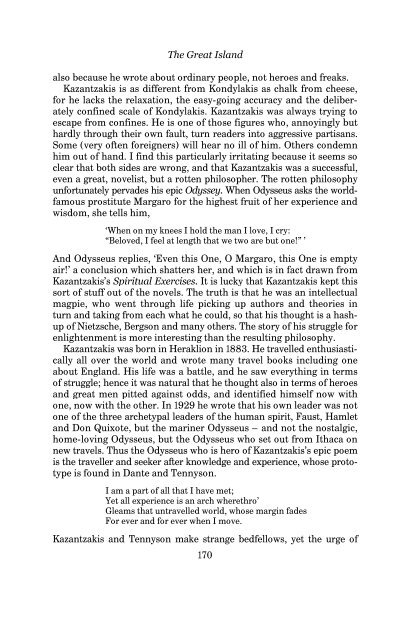free download here - Michael Llewellyn-Smith
free download here - Michael Llewellyn-Smith
free download here - Michael Llewellyn-Smith
You also want an ePaper? Increase the reach of your titles
YUMPU automatically turns print PDFs into web optimized ePapers that Google loves.
The Great Island<br />
also because he wrote about ordinary people, not heroes and freaks.<br />
Kazantzakis is as different from Kondylakis as chalk from cheese,<br />
for he lacks the relaxation, the easy-going accuracy and the deliberately<br />
confined scale of Kondylakis. Kazantzakis was always trying to<br />
escape from confines. He is one of those figures who, annoyingly but<br />
hardly through their own fault, turn readers into aggressive partisans.<br />
Some (very often foreigners) will hear no ill of him. Others condemn<br />
him out of hand. I find this particularly irritating because it seems so<br />
clear that both sides are wrong, and that Kazantzakis was a successful,<br />
even a great, novelist, but a rotten philosopher. The rotten philosophy<br />
unfortunately pervades his epic Odyssey. When Odysseus asks the worldfamous<br />
prostitute Margaro for the highest fruit of her experience and<br />
wisdom, she tells him,<br />
‘When on my knees I hold the man I love, I cry:<br />
“Beloved, I feel at length that we two are but one!” ’<br />
And Odysseus replies, ‘Even this One, O Margaro, this One is empty<br />
air!’ a conclusion which shatters her, and which is in fact drawn from<br />
Kazantzakis’s Spiritual Exercises. It is lucky that Kazantzakis kept this<br />
sort of stuff out of the novels. The truth is that he was an intellectual<br />
magpie, who went through life picking up authors and theories in<br />
turn and taking from each what he could, so that his thought is a hashup<br />
of Nietzsche, Bergson and many others. The story of his struggle for<br />
enlightenment is more interesting than the resulting philosophy.<br />
Kazantzakis was born in Heraklion in 1883. He travelled enthusiastically<br />
all over the world and wrote many travel books including one<br />
about England. His life was a battle, and he saw everything in terms<br />
of struggle; hence it was natural that he thought also in terms of heroes<br />
and great men pitted against odds, and identified himself now with<br />
one, now with the other. In 1929 he wrote that his own leader was not<br />
one of the three archetypal leaders of the human spirit, Faust, Hamlet<br />
and Don Quixote, but the mariner Odysseus – and not the nostalgic,<br />
home-loving Odysseus, but the Odysseus who set out from Ithaca on<br />
new travels. Thus the Odysseus who is hero of Kazantzakis’s epic poem<br />
is the traveller and seeker after knowledge and experience, whose prototype<br />
is found in Dante and Tennyson.<br />
I am a part of all that I have met;<br />
Yet all experience is an arch w<strong>here</strong>thro’<br />
Gleams that untravelled world, whose margin fades<br />
For ever and for ever when I move.<br />
Kazantzakis and Tennyson make strange bedfellows, yet the urge of<br />
170


